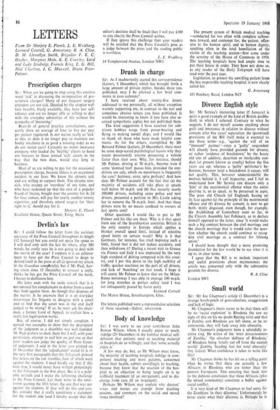Divorce English style
Sir: Mr Service's interesting letter (5 January) is quite a good example of the kind of British double- think to which I referred. Contrary to what he suggests, I do not myself assume anything about guilt and innocence in relation to divorce without consent after five years' separation; the (promised)
provisions of the Bill itself make it essential to use these terms—e.g., 'against the will of an "innocent" partner'—since a 'guilty' respondent will already have provided grounds for divorce, or rather 'evidence of breakdown,' by the hoary old sins of adultery, desertion or intolerable con- duct (at present known as cruelty) before the five years are up; whereas a 'guilty' petitioner's be- haviour, however total a breakdown it causes, will not qualify. This, however understandable the motives behind it, I call hypocrisy, and I fail to understand how Mr Service can discern only a 'hint' of the matrimonial offence when the entire doctrine is, so to speak, to be preserved in aspic. The poor old Church (of England), having set its face against (a) the principle of the matrimonial offence and (b) divorce by consent, is now to get both, thinly disguised, even though, for example, the Archbishop of Canterbury went so far, in the Church Assembly last February, as to -declare himself opposed to the latter, since 'it would make such a big contrast between the civil marriage and the church marriage that it would raise the ques- tion whether the church could continue to recog- nise civil marriage as a contract for lifelong union.'
I should have thought that a more promising foundation for the law would be to say what it is up to, in clear terms.
I agree that the Bill is to include important and useful provisions about maintenance; my article was concerned only with the substantive grounds for divorce.


































 Previous page
Previous page